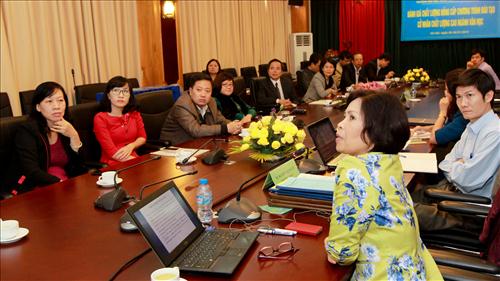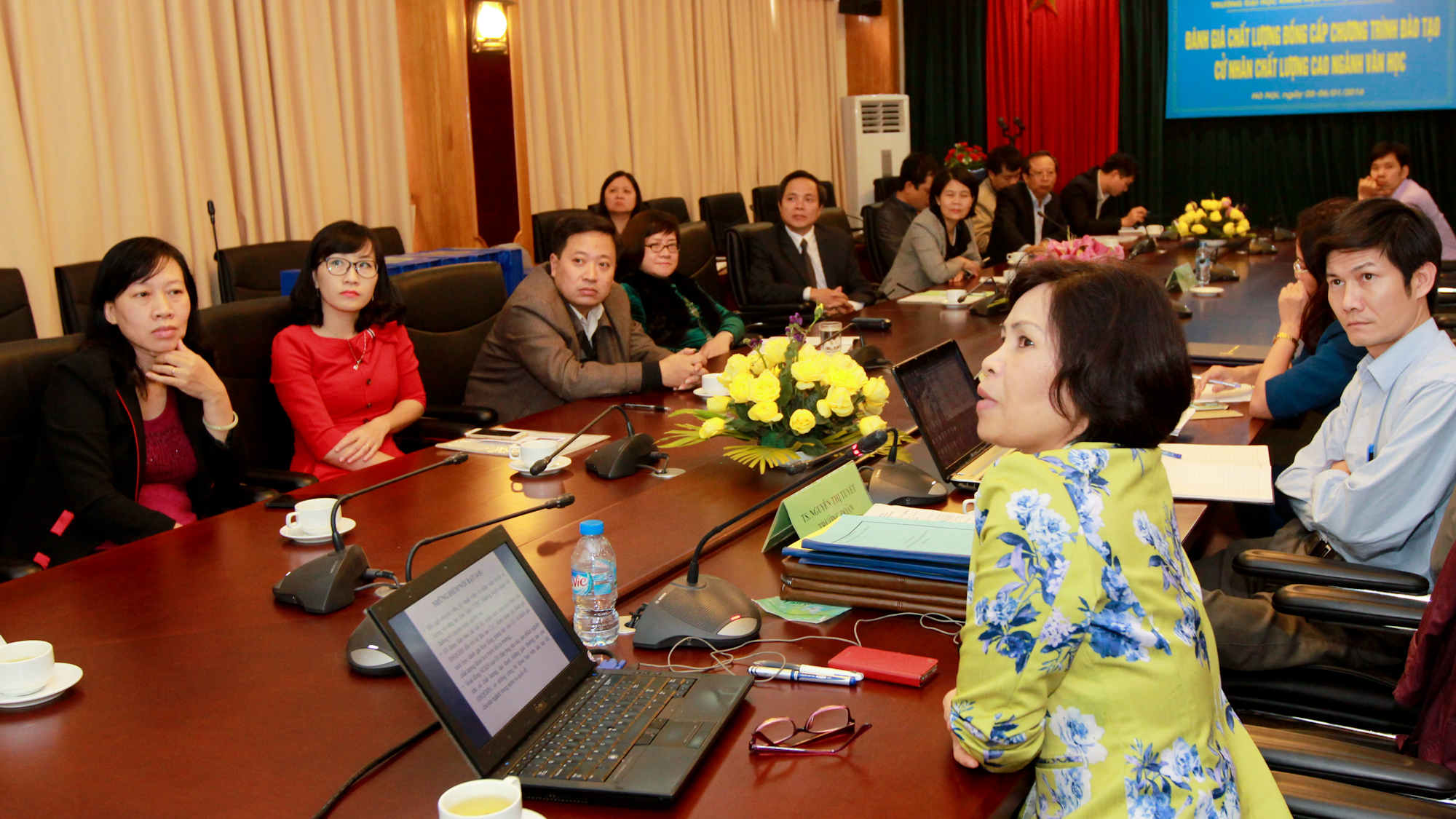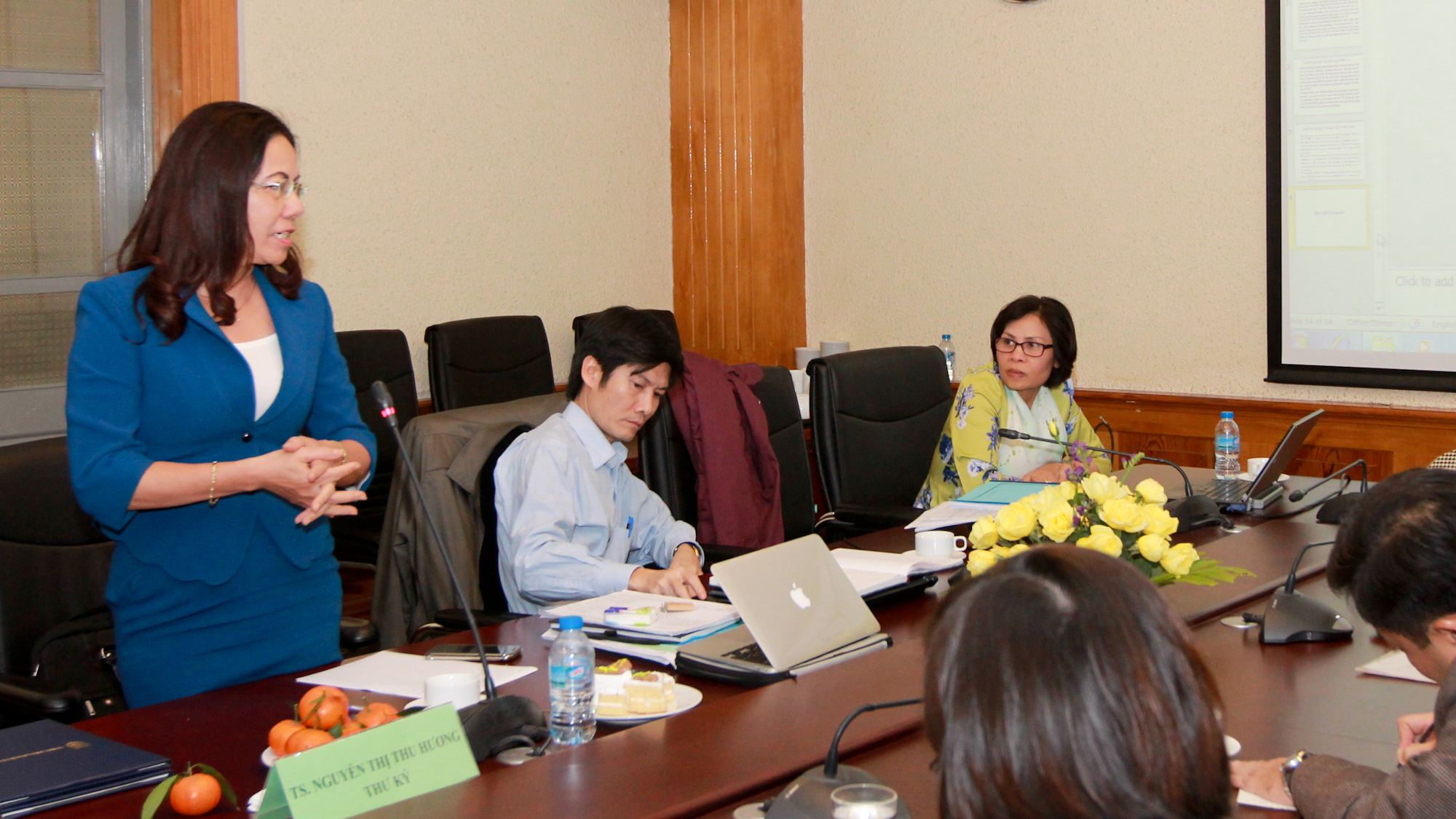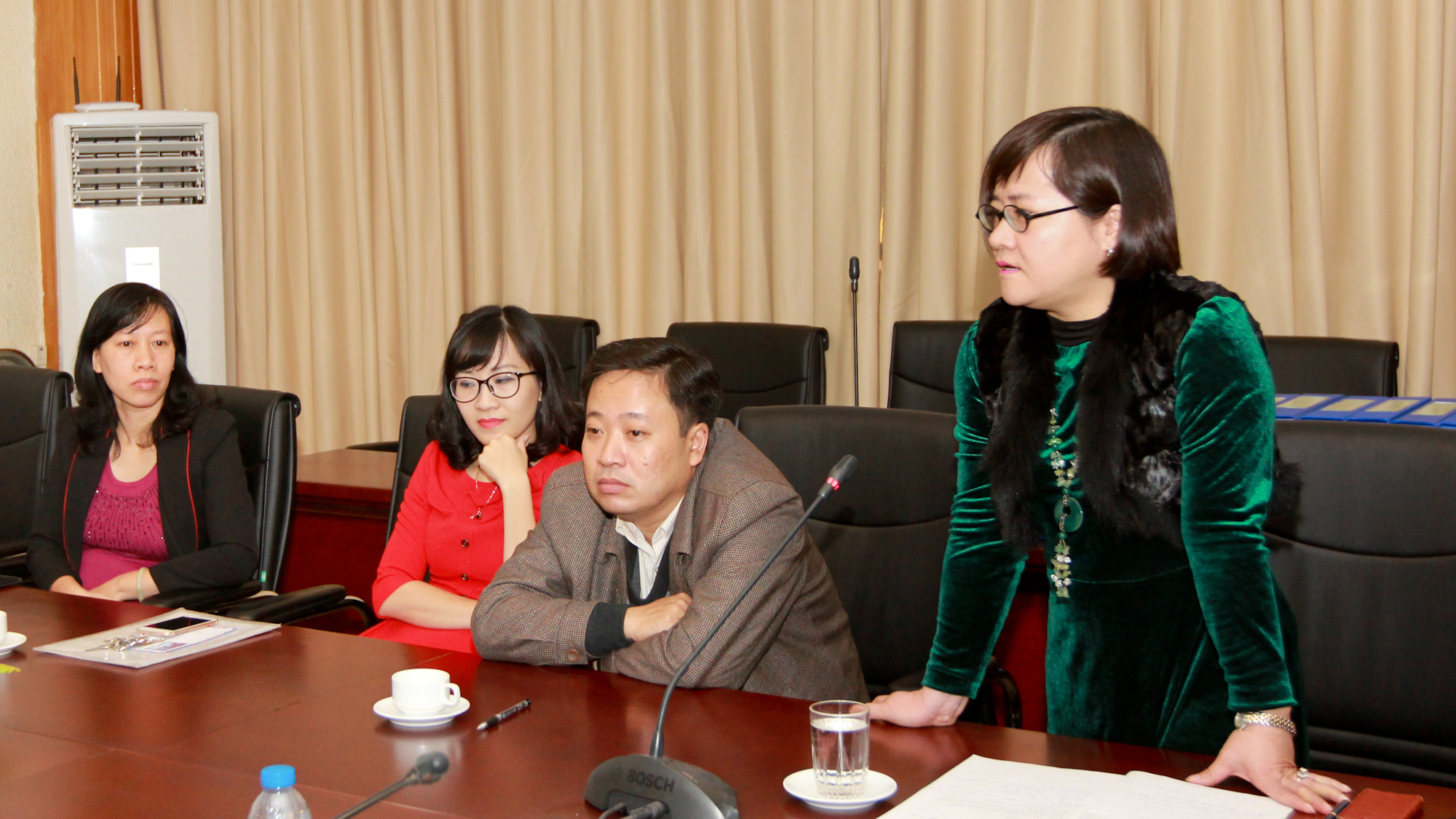
Opening the working session, Dr. Nguyen Thi Tuyet, Head of the peer review team, on behalf of the expert team, reported on the main findings of the two-day review process (January 5-6, 2016).
The evaluation team conducted the assessment based on the following principles: verifying authenticity, not proof; evaluating evidence; cross-checking information; independent verification; holistic and systemic evaluation; and recommendations based on the principle of "Doing it right before doing it well".

Dr. Nguyen Thi Tuyet, Head of the evaluation team, is reporting on the findings from the recent evaluation process.
Based on that principle, the evaluation team pointed out several outstanding features of the high-quality Bachelor of Literature program at the University of Social Sciences and Humanities, Vietnam National University, Hanoi, as follows:
The learning outcomes (LOs) of the training program, developed in 2012 and revised and updated in 2015, clearly outline the knowledge, skills, attitudes, personal, professional, and social ethics that align with the school's educational goals and the development orientation of the ngành (field/major), specialization, and the job positions that graduates can assume.
The curriculum has a rational structure, a balanced content, and aims to achieve the announced learning outcomes; the modules in the curriculum ensure pedagogical philosophy, ensure continuity and interconnectedness between disciplines and levels of study; ensure the breadth of foundational knowledge related to the field; and have a credit load and modules specifically for the high-quality training program as prescribed.
The curriculum content was adjusted in stages, from 2006 to 2012, with the participation of all faculty members and the Faculty's Scientific Council.
The Faculty issued a teaching and learning strategy (September 2012) aimed at putting students at the center; this strategy is consistent with the objectives and learning outcomes of the training program, emphasizing innovation and the application of advanced teaching methods, and encouraging students to proactively raise and solve problems with the support, advice, and guidance of lecturers.
The selection process for CLC students is transparent and clear.
The monitoring of students' academic performance throughout their studies is carried out systematically and comprehensively through educational management software.
The forms of assessment for student learning outcomes are diverse, ensuring accuracy, fairness, and transparency; the assessment standards are clear, consistent, and publicly announced before the start of each course.
The student counseling services were provided effectively.
The process for selecting lecturers to participate in the training program complies with regulations; there is a strategy for developing the teaching staff according to the set roadmap.
The teaching staff is competent, experienced, and highly responsible (45.2% hold PhD degrees; 26.2% are Associate Professors, and 17 out of 19 staff members are currently pursuing doctoral studies).

Dr. Nguyen Thi Thu Huong, secretary of the evaluation team, also provided additional insights into some aspects of the high-quality undergraduate program in Literature.
Students are guaranteed the policies and regulations of VNU for the high-quality training program, and are entitled to participate in course evaluations, lecturer performance evaluations, and course quality assessments before graduation.
The research activities of the lecturers meet the requirements; the research products are of high quality, have won high awards from Vietnam National University, Hanoi; and have published scientific papers in domestic and international specialized journals.
The study and reference materials in the Faculty's archives are relatively complete.
Students, alumni, faculty, and employers are generally quite satisfied with the program; graduates are highly regarded for their analytical thinking, research skills, and planning abilities.
Besides highlighting the strengths, Dr. Nguyen Thi Tuyet, Head of the evaluation team, also pointed out areas where the high-quality Literature training program needs improvement in the near future.
During the meeting, Dr. Nguyen Thi Thu Huong, secretary of the evaluation team, also provided additional insights into the high-quality Bachelor of Literature program. According to Dr. Huong, there is currently a gap between the program's learning outcomes and the employment prospects of its graduates. For example, the percentage of graduates who transition to working in journalism and media is high, while the percentage who find work in fields aligned with their career goals is low (around 20%).
"Communication and networking are still lacking. This is evidenced by the fact that students are only aware of the learning outcomes but are unclear about career orientation; students do not fully understand the purpose of feedback and evaluation activities; and employers want to connect with students from the department but lack opportunities," shared Dr. Nguyen Thi Thu Huong.

Dr. Pham Xuan Thach, Head of the Literature Department, spoke at the working session.
On behalf of the Faculty, Dr. Pham Xuan Thach, Head of the Faculty of Literature, expressed gratitude to the evaluation team for providing the Faculty with useful information for improvement.
"Implementing the evaluation of the CLC Bachelor's program in Literature is a very important activity. It's like identifying and diagnosing a problem in the training program, similar to a person undergoing a regular health check-up, thereby providing solutions for sustainable development in the future," said Dr. Pham Xuan Thach.
Highly appreciating the awareness of the faculty and lecturers of the Literature Department regarding quality assurance activities, Assoc. Prof. Dr. Tran Thi Minh Hoa, Vice Rector of the University and Vice Chairman of the Evaluation Council for the high-quality Bachelor's program in Literature, shared: "With two days of work, the evaluation team discovered many important issues regarding the high-quality Bachelor's program in Literature. This demonstrates the serious and effective work done."

Associate Professor Tran Thi Minh Hoa also shared that in 2016, the university will have a project to invest in smart classrooms. This will partially overcome the difficulties in facilities for the high-quality undergraduate program in Literature.
Regarding the evaluation team's comments on how to align the curriculum with societal needs, Associate Professor Tran Thi Minh Hoa said: "Training to meet societal needs is correct, but not at all costs. The philosophy of the high-quality Bachelor's program in Literature is to train top-tier professionals in the social sciences and humanities, so we cannot simply chase societal demands at all costs. Of course, the Faculty of Literature also needs to conduct research to find appropriate strategies for its development orientation."
"Assessment is an important step in the training process. But more important than that assessment is the issue of quality assurance," Associate Professor Dr. Tran Thi Minh Hoa emphasized.
In the future, the school will continue to implement various evaluation programs to further improve the quality of its education.
At the end of the two-day working session, the evaluation team will finalize and submit their report to the school within two weeks.
Author:Dinh Hau
Newer news
Older news